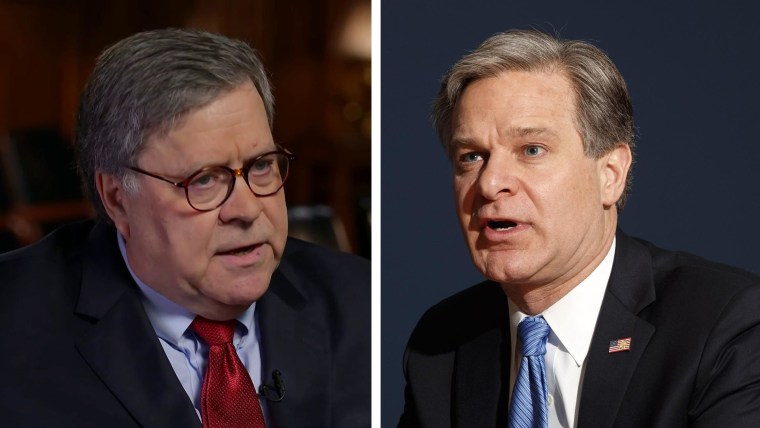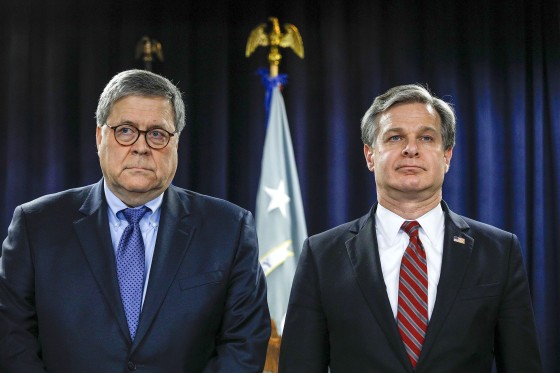WASHINGTON — At a Justice Department press conference on Thursday, FBI Director Christopher Wray sought to clarify how his agents were being used in nationwide protests and make it clear that the FBI is intent on protecting civil liberties, a message he has been seeking to push all week, according to three sources familiar with the planning of the press conference.
"The protectors can quickly become the oppressors, particularly for people of color," Wray said. "Civil rights and civil liberties are at the heart of who we are as Americans."
Wray's stance was distinct from that of Barr, who focused on violence caused by protestors to justify the deployment of federal agents and his authorization of the use of non-lethal force against crowds in front of the White House on Monday.
"They feel a strong need to delineate what they are and are not doing," said a source familiar with internal deliberations at the FBI. "You won't see FBI agents with a baton and shield."
The FBI's recent arrest of three men connected to the far-right "Boogaloo" movement for their attempt to provoke violence at protests also underlines the Bureau's distance from Barr who has, like Trump, said leftist extremist groups are to blame for the violence.
"This is representative of the FBI trying to avoid Barr's narrative by doing its job," the source said.
A senior DOJ official told reporters on Wednesday, “When it comes to dealing with riots, it’s really a state and local issue. That’s not typically the role of federal law enforcement.”
Attorney General Barr's surge of federal law enforcement to respond to protesters and unrest in cities around the country, particularly in D.C., has put some agencies in the uncomfortable position of defending their role in responding to protests, a situation few of their agents have been trained to meet.
Agents for the Drug Enforcement Administration, for example, were recently given new authority by Barr to "conduct covert surveillance" and make arrests, according to a memo first reported by BuzzFeed.
Agents from the Department of Homeland Security have also been called to respond to protests. Over 300 Customs and Border Protection officers and agents in the D.C. region were deployed beginning Monday night, a call that came with little warning or planning, according to a DHS official.

Most of the agents working in D.C. have desk jobs, unlike their colleagues working at the border and ports of entry, and may not be prepared to respond to protests or riots.
"They aren't in the field for a reason," the official said, speaking on the condition of anonymity.
A spokeswoman for CBP said, "All CBP officers and agents have received training at the Federal Law Enforcement Training Center (FLETC) and are trained to assist other law enforcement entities in this situation."
Officers trained to break up prison riots with the Bureau of Prisons were criticized on Wednesday for not wearing identifying uniforms when standing up to protesters on 16th Street, near the White House.
A statement from the agency said its teams "do carry badges and are not wearing BOP specific clothing as they are serving a broader mission." A spokesman for BOP said its authority to respond to protests was given to it by the U.S. Marshals Service because BOP will be responding to situations it would not normally encounter in a prison, such as making arrests.
Spokespeople for the U.S. Marshals, DEA, CBP, ICE, ATF, BOP and FBI all declined to say how many agents they had deployed in response to protests.
A senior DOJ official told reporters late Wednesday that the response to protests across the country was 85 percent state and local police and 15 percent federal law enforcement.
Chuck Wexler, executive director of the Police Executive Research Forum, said the combination of so many agencies working on top of each other in areas in which they do not normally operate could be dangerous.
"If you put a bunch of people together that haven't trained together, haven't worked together, then you're going to have a dangerous outcome. You're going to have an unpredictable outcome," Wexler said.
He added that in responding to past protests such as the Occupy movement, local and state police have learned to start with soft tactics, such as working with informal leaders, before escalating to confrontation.
"That's what you need. You want people who have worked together and are under tight controls in terms of use of force," Wexler said.



